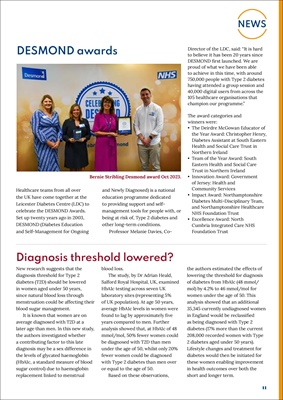
11
NEWS
DESMOND awards
Healthcare teams from all over
the UK have come together at the
Leicester Diabetes Centre (LDC) to
celebrate the DESMOND Awards.
Set up twenty years ago in 2003,
DESMOND (Diabetes Education
and Self-Management for Ongoing
and Newly Diagnosed) is a national
education programme dedicated
to providing support and selfmanagement
tools for people with, or
being at risk of, Type 2 diabetes and
other long-term conditions.
Professor Melanie Davies, CoDirector
of the LDC, said: "It is hard
to believe it has been 20 years since
DESMOND first launched. We are
proud of what we have been able
to achieve in this time, with around
750,000 people with Type 2 diabetes
having attended a group session and
40,000 digital users from across the
105 healthcare organisations that
champion our programme."
The award categories and
winners were:
• The Deirdre McGowan Educator of
the Year Award: Christopher Henry,
Diabetes Assistant at South Eastern
Health and Social Care Trust in
Northern Ireland
• Team of the Year Award: South
Eastern Health and Social Care
Trust in Northern Ireland
• Innovation Award: Government
of Jersey: Health and
Community Services
• Impact Award: Northamptonshire
Diabetes Multi-Disciplinary Team,
and Northamptonshire Healthcare
NHS Foundation Trust
• Excellence Award: North
Cumbria Integrated Care NHS
Foundation Trust
Diagnosis threshold lowered?
New research suggests that the
diagnosis threshold for Type 2
diabetes (T2D) should be lowered
in women aged under 50 years,
since natural blood loss through
menstruation could be affecting their
blood sugar management.
It is known that women are on
average diagnosed with T2D at a
later age than men. In this new study,
the authors investigated whether
a contributing factor to this late
diagnosis may be a sex difference in
the levels of glycated haemoglobin
(HbA1c, a standard measure of blood
sugar control) due to haemoglobin
replacement linked to menstrual
blood loss.
The study, by Dr Adrian Heald,
Salford Royal Hospital, UK, examined
HbA1c testing across seven UK
laboratory sites (representing 5%
of UK population). At age 50 years,
average HbA1c levels in women were
found to lag by approximately five
years compared to men. Further
analysis showed that, at HbA1c of 48
mmol/mol, 50% fewer women could
be diagnosed with T2D than men
under the age of 50, whilst only 20%
fewer women could be diagnosed
with Type 2 diabetes than men over
or equal to the age of 50.
Based on these observations,
the authors estimated the effects of
lowering the threshold for diagnosis
of diabetes from HbA1c (48 mmol/
mol) by 4.2% to 46 mmol/mol for
women under the age of 50. This
analysis showed that an additional
35,345 currently undiagnosed women
in England would be reclassified
as being diagnosed with Type 2
diabetes (17% more than the current
208,000 recorded women with Type
2 diabetes aged under 50 years).
Lifestyle changes and treatment for
diabetes would then be initiated for
these women enabling improvement
in health outcomes over both the
short and longer term.
Bernie Stribling Desmond award Oct 2023.